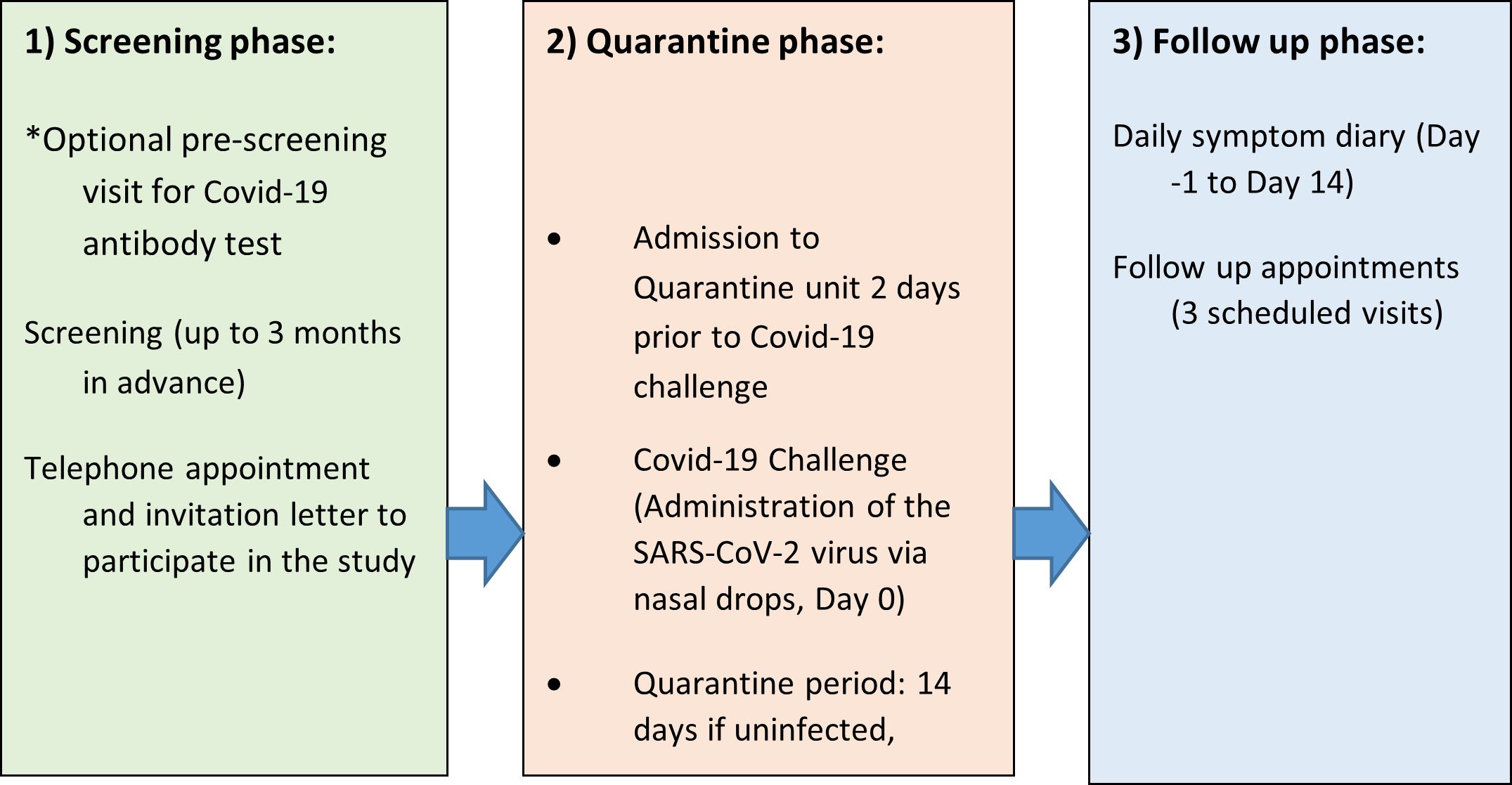What does the trial involve?
The study will consist of 3 phases:

You will be in the study for 6 months from enrolment (Day of administration of the virus) to the last clinic appointment.
*At later phases of the study we may invite volunteers for a pre-screening visit where we will take a blood test for antibodies against Covid-19. We would then only invite volunteers for a full screening if they had lower antibodies against Covid-19.

Figure 1: Study timeline (Note that the inpatient quarantine period may extend beyond D14 if you are still infectious)
We plan to recruit up to 72 participants into two groups:
Group 1: Safety and dose finding group in previously infected volunteers where each dose will be tested in 5-12 participants
We will start by testing a dose of the virus determined by previous studies, with the aim of infecting 50-75% of volunteers. If we do not achieve this infection rate we will test higher doses if needed. An independent Data Safety Monitoring Board will be monitoring the study and will tell us to continue, increase or decrease doses. You will be informed which dose group and/or cohort you are assigned to. You would only receive the virus once and cannot choose which dose group or cohort you are in.
If we are unable to achieve our target infection rate we may invite volunteers for a pre-screening visit where we will take a blood sample to test for antibodies against Covid-19. We would then invite volunteers to take part in the study only if their antibodies were in the lower range.
Group 2: Safety and dose confirmation in previously infected volunteers in up to 24 participants
Once an optimal dose of the virus has been selected in the dose finding group (group 1), we will enrol up to 24 participants in group 2 using this dose. If we needed to select volunteers on the basis of antibody levels in group 1 we will also select volunteers by antibody level for group 2.
What are the advantages of taking part?
You will not gain any direct benefit from the study, however, during pre-study assessment you will get information about your health including results from a medical examination, blood tests, urine tests, chest x-ray, ECG (heart trace) and lung function tests. Note, these assessments are not carried out for diagnostic purposes and should not be considered a substitute for a doctor’s visit.
We hope that the information we gather from this study will lead to a test of protection against Covid-19 and better vaccines/treatments that could help many people around the world.
You will also receive compensation for your time, inconvenience and travel of approximately £4,935 for full study participation.
Are there any risks from taking part in the study?
SARS-CoV-2 is still causing disease ranging from asymptomatic or mild illness to severe respiratory disease that can also affect other parts of the body in large numbers of people throughout the world. Humans have only experienced infections with this virus since late 2019 and the full range of symptoms or diseases caused by Covid-19 is still being investigated. Therefore, at present it is not possible to predict completely the risks to you from participating in this study.
Some people when infected with Covid-19 experience no symptoms at all. More severe cases of Covid-19 disease are usually seen in the elderly (over 65 years of age) and those with pre-existing medical conditions (such as diabetes). Although the risks of hospitalisation and death are thought to be very low in young healthy people the factors that might increase the risk of such events in young persons are not completely known and therefore may not be detected in the screening process prior to entering the study.
On average, for people infected with the Omicron variant of SARS-CoV-2, symptoms last for 8 days and in 95% of cases are better within 18 days. However, some people have symptoms that last for longer, particularly tiredness/fatigue, cough and changes in their sense of smell or taste. In a small number of people these have gone on for over 3 months. Office for national statistics data showed that 4% (4 in 100) of double vaccinated people self-reported long Covid 12-16 weeks after a first Omicron infection. We would expect these symptoms to resolve slowly over time but cannot guarantee that this will be the case. If you develop symptoms of “long Covid”, you will be followed up closely and referred for treatment if necessary.
Please refer to the information sheet for full details of procedures and potential risks.
What will happen if I don’t want to carry on with the study?
Participation is voluntary and you are free to change your mind and withdraw at any time. However, if you decide to withdraw your consent and `leave the study' during the quarantine phase, you will be very strongly encouraged to remain in the Quarantine unit until you are no longer contagious. This is for both your safety and that of others whom you could infect as a contact. In this situation, we would continue to optionally offer you all procedures considered important for safety purposes by the study team but would stop any research procedures.
If you withdraw from the study, any samples and data collected before your withdrawal will be used/stored unless you specifically request otherwise. However, if any of your pseudo-anonymised data has been incorporated into the study, it will not be withdrawn or erased in order to comply with our legal obligations and to maintain the scientific integrity of the study.
Please refer to the information sheet for more details.
Accordion widget
Contact us
To get in touch with a member of the study team, please email imperial.humanchallenge@nhs.net